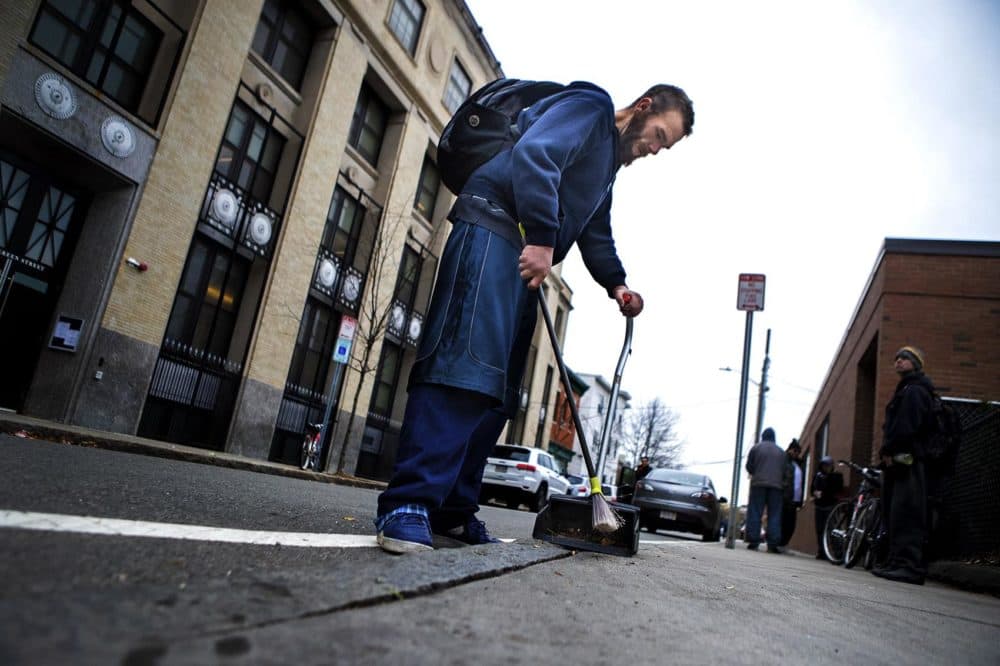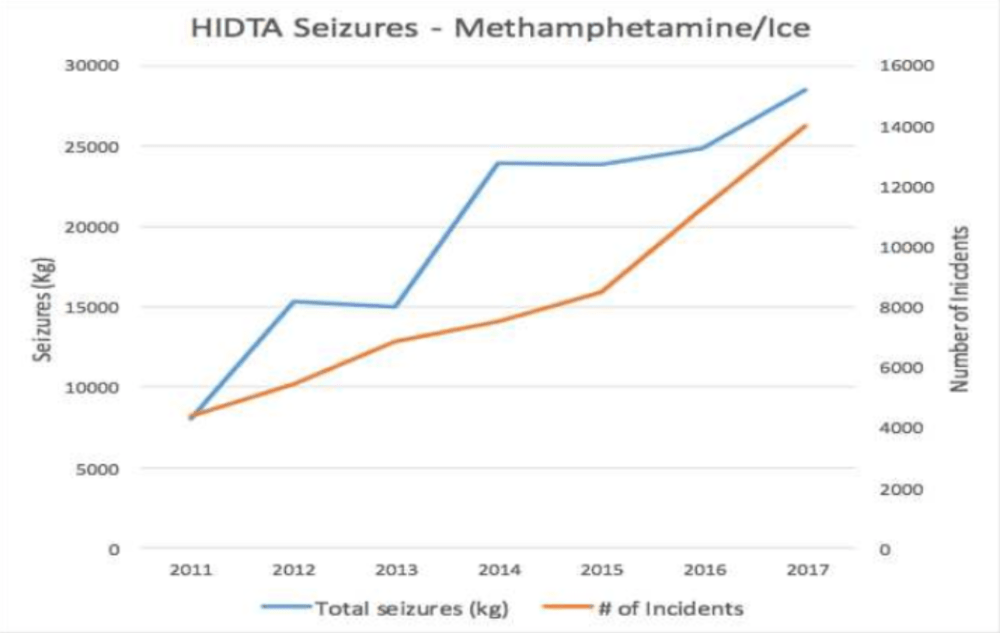Advertisement
Meth Use Is Rising In Boston, Intensifying The Opioid Crisis
Resume
There’s a street drug that barely registers on state graphs of drug overdose deaths. But some drug users, doctors and drug intelligence experts say methamphetamine, a longstanding problem in more rural states, is an emerging threat in Massachusetts that is already compounding the opioid epidemic.
For a little background — meth is a stimulant, like cocaine. It's similar, in structure, to legal drugs used to treat ADHD. There’s a form called crystal meth that looks like shiny, bluish chunks of glass. And there’s a white powder, which is how a man we’ll call just Michael because of his illegal drug use, was introduced to meth about three years ago.
As Michael tells it, he and his girlfriend had a heroin dealer who started mixing meth into his bags of dope.
"I was injecting meth without knowing it," Michael says. "Then I shot it, just straight meth, and I fell in love."
A few steps away, on a city block in Cambridge, a woman named Jade says people of all ages are falling into the same trap.
"Young kids, older people are doing meth because in your 60s and 70s it makes you feel 20, physically," says Jade. "It’s an amazing feeling but it’s an evil, evil, evil drug."
Evil because a user speeds through two, three or four days without sleep, crashes and then repeats the cycle, damaging their heart, brain, lungs, kidneys, teeth and skin.
Jade points to sores on her face, some open, some closing. She tugs a black cloth headband over one large scab.
"This is from meth," Jade says. "Like if you had a bullet inside your body and it's trying to come out, eventually it's going to come out."
Michael pulls up a pant leg to reveal a calf pocked with sores. But he’s hooked.
"You think the heroin epidemic is something. You have no clue. Everyone is switching to it, the meth," Michael says.
They switch because meth is cheaper and users don’t feel as sick when they come down. Women say they smoke, snort or inject meth to stay awake at night and avoid rape or theft. Other drug users say they tried meth because they were afraid of overdosing on fentanyl. But now there are reports of fentanyl added to meth, either intentionally or accidentally.
Michael says more meth is bad news for everybody. Think of it, he says, with opioids, a drug user nods off.
"A meth head is out, freaking out, running around the streets and when they don’t have what they want, they’re going to do whatever they have to do to get it," Michael says. "The heroin epidemic is like preschool hour compared to when this gets full tilt."
'Much Harder To Treat'
In the Boston area, meth may hit full tilt sooner rather than later.
"We’re on the verge of it really engulfing our drug using population out here," says Kristin Doneski, the outreach manager at Access, a drop-in center for drug users in Cambridge that offers support groups, a needle exchange, basic nursing and overdose education. Doneski says about a quarter of her clients are using meth — more than double the rate two years ago — and those numbers continue to rise.
"We’ve really had to research new resources for people because we don’t have a lot of them here," Doneski says.
Doneski is downloading brochures and articles about meth alerts from the West and Midwest where meth is already entrenched in the drug supply. Doctors are looking west as well for guidance. A patient who is bouncing around a room on meth is very different from one slumped on a couch, sedated by heroin or fentanyl.
"When people come in under the influence of methamphetamine they can often be paranoid, they can be very fearful, so it’s important for all staff, including front desk staff, to be trained in how to de-escalate," says Dr. Laura Kehoe, medical director of the Bridge Clinic at Massachusetts General Hospital (MGH). Patients with a substance use disorder can walk into the clinic for primary care, group meetings or just to hang out.
"The heroin epidemic is like preschool hour compared to when this gets full tilt."
Michael
These days, Kehoe tells staff to move meth patients to the top of her walk-in list. But once inside the exam room, Kehoe’s treatment options are limited. Some meth users use an ADHD med like Adderall or Vyvanse, which are in the same drug family as meth, to manage their addiction. But there are no approved meds for treatment of a methamphetamine use disorder. Kehoe says the few programs that treat a meth addiction use rewards and relapse warning cues to help patients stop taking the drug.
"These are behavioral interventions that are very difficult for people to access when they’re in the throes of an addiction, particularly if they’re living in environments where there’s a lot of drug use or on the street," Kehoe says.
Dr. Michael Bierer, president of the Massachusetts Society of Addiction Medicine, echoes Kehoe's frustration with meth treatment.
"I have very good tools to provide patients with opioid use disorder, and I'm fairly confident of my ability to be effective and helpful and for people to get better," says Bierer. "Methamphetamine or cocaine addiction is much harder to treat."
The state Department of Public Health says patients seeking treatment for a meth addiction typically go right into what's known as a clinical stabilization service, a program that gets the patient off the street and away from the drug for a few days. It's not clear how many behavioral treatment programs for meth there are in Massachusetts. A list provided by the state helpline included programs that do not admit meth patients.
Doctors hesitate to compare an addiction to meth, cocaine or an opioid. With meth, Bierer warns, patients can become addicted very quickly.
"People shouldn't experiment lightly," Bierer says. "If you're at risk for addiction anyway, if you're already addicted to some other drug, you're playing a very dangerous game when you take methamphetamine."
But many active drug users are now trying meth, in part, because it is more available.
'It’ll Catch Up With' The Northeast
A recent report from the National Emerging Threats Initiative (NETI) says most of the meth sold is the U.S. is produced in Mexico and shipped through the same suppliers who deal in heroin, fentanyl and cocaine.
"So what you’re dealing with now is a much more pure meth and with people very actively promoting its use. It’s very dangerous and will cost many lives," says John Eadie, one of the report's authors. Eadie is the public health and prescription drug monitoring project coordinator for NETI, a program that advises dozens of state and federal agencies including the U.S. Drug Enforcement Administration.

Some drug intelligence officers expected the arrest and trial of Joaquín "El Chapo" Guzmán would reduce meth production in Mexico and sales in the U.S., but that hasn't happened, according the NETI report. If concern about meth isn’t front and center in Massachusetts, says Eadie, it should be.
"It’ll catch up with you," Eadie warns. "What’s going on in the nation is simply a forerunner for what you can expect in the Northeast."
Across the country meth overdoses are up, with symptoms of a heart attack, seizure, paranoia or a stroke. Meth barely shows in current death data for Massachusetts but Eadie is not surprised. Meth damage to the brain, heart and other organs is cumulative, not immediately fatal.
"You're not necessarily going to see the full impact of what started up with abuse of meth right now for another four to five years," Eadie says.
Meth is already interfering with, if not compounding, the opioid epidemic. Patients addicted to heroin or fentanyl are often prescribed a daily medication to curb cravings. But Kehoe says lately, many patients will try meth while in treatment for their opioid use disorder and lose track of that treatment plan.
"There’s this kind of binge and crash cycle which makes it very hard for people to keep appointments, to show up on time, to really engage in care," Kehoe says.
The Bridge Clinic plans an expansion with space for patients to rest, sleep and ride out these binge and crash cycles. Kehoe says she's worried that some doctors are withholding buprenorphine or methadone from patients with an opioid use disorder if they are on meth. She says physicians must try to treat both addictions.
"If you're at risk for addiction anyway, if you're already addicted to some other drug, you're playing a very dangerous game when you take methamphetamine."
Dr. Michael Bierer
The new warnings about meth, on top of evidence that cocaine and benzodiazepines are present with fentanyl in the vast majority of overdose deaths, suggest we no longer have an opioid specific epidemic, says Michael Botticelli with the Grayken Center at Boston Medical Center.
"The data are pretty clear that we have a drug use epidemic and a drug overdose epidemic," he says. "I think we have to really be careful that our strategies speak to all of those issues."
We have to focus, says Botticelli, on the deeper reasons our friends and family members use drugs.
This article was originally published on November 21, 2018.
This segment aired on November 20, 2018.
